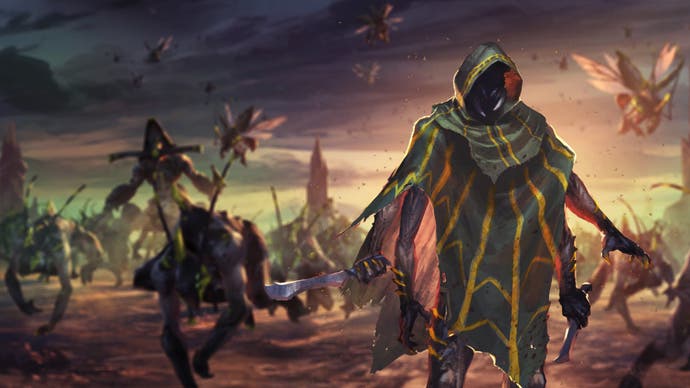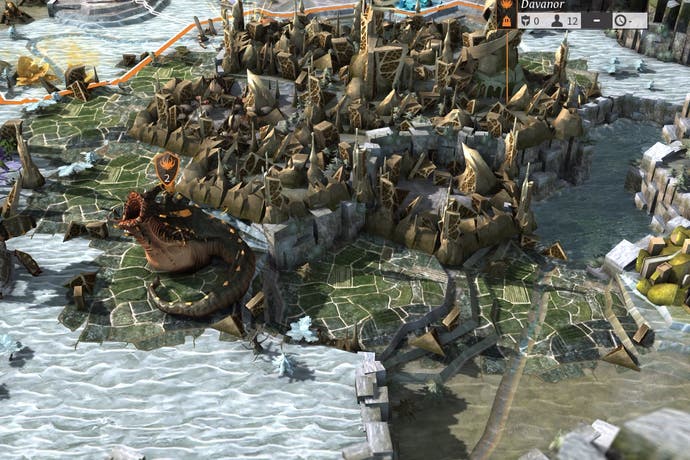Can a 4X title hold insights into how games could handle storytelling?
Explore, expand, exploit, exposition.
The best - or at least the most famous - stories in video games are rarely the best video game stories. Yes, you can argue that the morally grimy ending of The Last of Us is up there with darker blockbuster movies, that the BioShock series' philoso-scientific musings are at least at the Christopher Nolan level. But none of these games utilise the storytelling tools specific to the medium. Their narratives are simply well-presented, well-written slices of steady exposition interposed between segments of competent, if often generic, mechanics.
The best video game stories, on the other hand, take advantage of those gamey idiosyncrasies you won't find in other media - mechanics, player agency, non-linearity - to play as big a part in the narrative as the writing. Plenty has been said about how walking simulators and the Souls series achieve this, but much less documented is the peculiar delights of storytelling in strategy games. And there's one strategy series in particular that stands out.
Amplitude Studios' Endless saga! If you ask me, Endless Legend and Endless Space 1 and 2 (as well as oddball tower defence title, Dungeons of the Endless) represent an interconnected masterclass in video game storytelling, working within the strict rulesets of 4X strategy to intertwine narrative and mechanics until they both hum with potential.
Stripped back, these games broadly follow the same rules as genre champion, Civilization. You build an empire, you expand it, and then you race towards one of several preset victory conditions - scientific, military, economic, whatever. Endless Space is set in a hard sci-fi universe of spaceships, planetary colonisation and black holes, while Endless Legend takes place on the fantasy world of Auriga, replete with dragon-people and magic, yet with a techy slant and strange races that set it apart from typical high fantasy. But where Civilization leaves players to form their own internal narratives within its mad mashup of iconic leaders, nations and Wonders, the Endless series contains a vast mythos that you uncover bit by bit each time you start a new game, manifesting itself in wonderfully written quests, factions and artefacts, some of which create narrative threads across the entire series.
Each time you begin a new instance of Endless, it's not only a fresh start in a procedurally generated world or galaxy, but a plunge deeper into its lore. It's like turning to a random page in an encyclopaedia that charts a forgotten land. In Endless Space 2, for instance, you may happen upon the Pilgrim faction; mystical-scientific space nomads obsessed with discovering the origin of the Endless - the mysterious, extinct interstellar species that once colonised the galaxy, leaving behind remnants of their technologies and creations.
So if you befriend the Pilgrims, you gain a slither of insight into the Endless, but also into the United Empire, the human faction that the Pilgrims broke away from, which veils its autocracy behind a veneer of cheery, rousing propaganda. In doing so, your understanding of galaxy dynamics bumps up, and that accrued knowledge enriches your next game just a little bit more. It is narrative with a strange cumulative twist, getting richer through repetition and deviation. This feels like a thing only games can truly pull off.
And it only gets richer. Perhaps you played as the Pilgrims in the original Endless Space, in which case you'll understand why the science-based Sophon faction get a bit of Pilgrim population on each of their new planets in Endless Space 2 (short answer: they're all technocratic boffins). Such moments of world-building feel incidental, scattered like a constellation of a thousand stars with no line yet drawn between them. But the more you play, the more these disparate stories and plots come together. Within the apparent randomness of a 4X map, you begin to find a vast cosmic order.
Side-quests, meanwhile, aren't just a means of gaining a few extra resources or giving you a Thing To Do during the mid-game lulls that dog all 4X games. Their greater purpose is to leave narrative breadcrumbs that guide you through the vestiges of Auriga's and the Endless Galaxy's history, much how the enigmatic item descriptions in Dark Souls function for their forlorn kingdoms.

In Endless Legend, you may stumble upon an enclave of Eyeless Ones - blind creatures that are more interested in the metaphysical world than the physical - who use an ancient ruin as a site of worship. In exchange for building them a temple in one of your cities, they offer to leave the riches of the ruin to you. Do this, and you get some resources that will provide a short-term boost. But more significantly, by letting them practice their faith in your city, you learn that they worship "great incarnations of beings" that predate even the Endless (it's got to be Cthulhu, right?). Through this enigmatic paragraph of information, triggered by your completion of a side-quest, you're opened up to the vast mysteries of the universe - with more questions raised than answered. Maybe in a future instance of Endless Legend - or Endless Space - you'll happen upon a seemingly unrelated quest or sub-plot that teaches you more about these primordial gods, or maybe it's just the crazed superstition of a bunch of blind monks. The randomised element of each new game means that you never know which pages of Endless lore your explorations will lead you to discover. Narratives you can dig away at: what a glorious thing.
Faction mechanics also act as a narrative device, creating unique perspectives through which you relate to the Endless universe. Where your typical 4X game - your Age of Wonders or Civ - distinguishes playable factions by unique appearances, units, and a few stat modifiers here and there that affect your game in minute ways (e.g. where to build a city), in the Endless series your faction completely reframes how you play.
The Cultists, for instance, can only build a single city, and spread their influence by assimilating minor tribes throughout the world to their cause. Systems and storytelling unite: this peculiarity of the Cultists makes you regard each tribe as a rabble of benighted peoples who must be converted to the way of the Eternal End by whatever means necessary. Where in a previous game of Endless, playing as a more moderate faction, you may have considered minor factions as invaluable allies and major factions as trading partners, playing as the Cultists you see them as converts-in-waiting and heathens, respectively.
The insectoid Necrophages, meanwhile, feed on the cadavers of the war dead to stockpile food - minor faction villages effectively becoming battery farms that churn out living meat for you to consume. Their Endless Space equivalent (and possibly canonical evolution), the Cravers, are voracious consumers, enslaving the populations of each planet they conquer. In both cases, you're funnelled into a dissociative view of other peoples; they're either feed or fuel for the Hive, nothing more, and the narratives justify your callous stance.

Similarly dramatic rules apply to just about every faction, so despite you still having that freedom of approach endemic to 4X games, you're driven by your faction's nature, story and agenda. Like some video game form of brainwashing, the harmony of mechanics and compelling faction quests - written in the tone and prose you'd expect that faction to communicate - forces you into their world-view, even when it's against your natural inclinations.
There is no official chronology between the Endless games, no confirmation of whether it all begins on Auriga and ends in space, or the other way round, only narrative nuggets guiding players towards the junctures between these sci-fi and fantasy worlds. Like so much of Endless lore, it's there for fans to theorise over rather than for developers to state. Just as first-person shooter mechanics were repurposed into walkings simulators, and the Souls series turned the Metroidvania formula into a web of tragic stories told through lone wanderers and trinkets, the Endless series uses all the 4X rules to map out a mythological world as we play.
And it asks searching questions of the industry. Do all video game genres, with their unique traits and tricks, have the potential to tell stories through mechanics? Could games be more daring in offering asymmetrical experiences, where your faction or character selection dramatically reshapes your experience of the game world? And this: Why do sci-fi and fantasy-set games abide so rigidly by traditional genre laws, when Amplitude demonstrates that the two can elegantly co-exist without sounding like farcical fan-fiction fusing Dragon Age and Mass Effect, or Game of Thrones and Star Wars?


